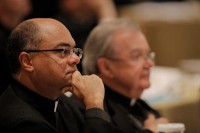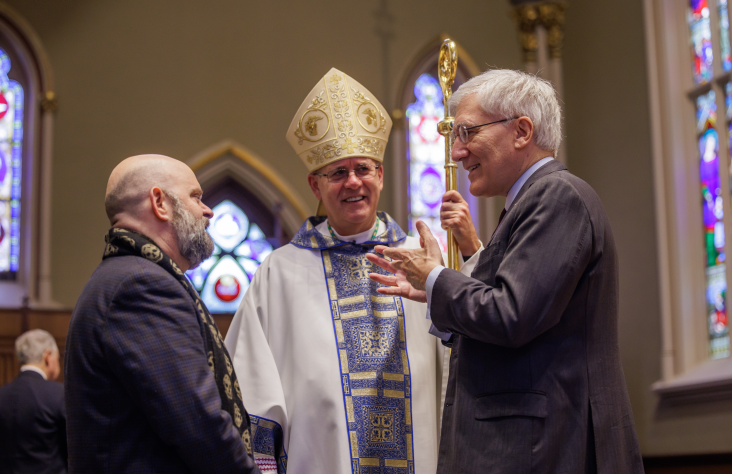November 19, 2015 // Uncategorized
Use of pornography called 'mortal sin' if done with 'deliberate consent'
By Mark Pattison

Bishop Shelton J. Fabre of Houma-Thibodaux, La., listens to a speaker Nov. 16 during the opening of the 2015 fall general assembly of the U.S. Conference of Catholic Bishops in Baltimore. (CNS photo/Bob Roller)
WASHINGTON (CNS) — The U.S. bishops approved a statement on pornography on the second day of their Nov. 16-19 fall general meeting in Baltimore.
“Producing or using pornography is gravely wrong. It is a mortal sin if it is committed with full knowledge and deliberate consent. Unintentional ignorance and factors that compromise the voluntary and free character of the act can diminish a person’s moral culpability,” says the approved version of “Create in Me a Clean Heart: A Pastoral Response to Pornography.”
The bishops passed the document Nov. 17 in a 230 to 4 vote, with one abstention. It needed 181 votes to pass.
“This sin needs the Lord’s forgiveness and should be confessed within the sacrament of penance and reconciliation,” it says.
“Those who produce and distribute pornography harm the common good by encouraging and even causing others to sin,” it says.
The statement, prepared by the bishops’ Committee on Laity, Marriage, Family Life and Youth, adds: “There are many victims of pornography. Every person portrayed in it is beloved by God our father and is someone’s daughter or son. All child pornography is automatically trafficking and a crime, because it involves the sexual exploitation of a minor for commercial gain and it is against the child’s will due to the inability to give consent.”
It noted, “Many people struggle with pornography use, including faithful Catholics, people of faith, people of no faith, married and single people, fathers and mothers, the young and the old, clergy and those in consecrated life.”
In presenting the document to the bishops Nov. 16, the first day of their annual fall general meeting in Baltimore, Bishop Richard J. Malone of Buffalo, New York, chairman of the committee that prepared it, described pornography as a “dark shadow in our world today.”
He said that it is a “particularly sinister instance of consumption” whereby men, women and children “are consumed for the pleasure of others.”
Bishop Malone noted that the statement, which has been in the works for three years, is “purposely comprehensive” but can by no means address the entire issue. Instead, he said, it should be seen as more of a “launch pad” promoting further discussion and resources to help those harmed by pornography.
He said Pope Francis has urged the U.S. bishops to seek out and heal wounds and the pornography document provides a means to do that.
Using the penitential Psalm 51 for both the title and as a recurring motif throughout the statement, the introduction says: “As pastors of the Catholic Church, we offer this statement to give a word of hope and healing to those who have been harmed by pornography and to raise awareness of its pervasiveness and harms.
“In the confessional and in our daily ministry, we have seen the corrosive damaged caused by pornography: children whose innocence is stolen; men and women who feel great guilt and shame for viewing pornography occasionally or habitually; spouses who feel betrayed and traumatized; and men, women and children exploited by the pornography industry.”
It notes pornography has “always been a problem” but over the years its impact has grown “exponentially.”
The statement borrows from the Catechism of the Catholic Church to define it: “Pornography consists in removing real or simulated sexual acts form the intimacy of the partners, in order to display them deliberately to third parties. It offends against chastity … It does grave injury to the dignity of its participants.”‘
“It encompasses what is sometimes distinguished as ‘soft’- and ‘hard-core’ pornography,” the statement adds. “This is an artificial divide; all pornography is harmful and wrong, while the effects on a person may vary on the intensity of the content. Pornography is not art.”
It says, “Pornography can never be justified and it is always wrong.”
The statement also links pornography to other sins, “especially masturbation. Masturbation, which is deliberate, erotic stimulation often to the point of orgasm, commonly occurs together with pornography use. While popular culture largely sees it as acceptable, masturbation is always gravely contrary to chastity and the dignity of one’s body.”
It notes pornography’s pervasiveness: “Erotic, oversexualized, and pornographic images are more present in American society than ever before. … Mainstream entertainment itself has become hypersexualized. Novels that at one time would have been classified as ‘erotica’ are mainstream, to say nothing of the overtly sexual romance novel genre.” Video games, music lyrics, music videos and clothing are also oversexualized, it adds.
The statement calls pornography “an industry of sin.” “Pornography is a big business. Estimates of revenue stretch easily into the billions of dollars every year. The pornography industry is aggressive, savvy and regulated only sporadically,” it said. “Other business, such as hotel chains, cable companies and drugstores, profit greatly from the widespread use of pornography and contribute to its accessibility.”
That pervasiveness leads to negative effects on people and society, according to the statement.
“Men are particularly susceptible to pornography because the male brain is strongly drawn to sexual images, a kind of ‘visual magnetism’ aggressively exploited by the pornography industry,” it says, adding it can lead to addiction. Women “use pornography for similar reasons as men,” it says, and are told wrongly that “using pornography is liberating for them.”
Pornography filters down to younger people, accounting for the rise of “sexting,” sexually explicit text messages “associated with other risky sexual behaviors,” the statement says, including “greater risk of getting pregnant as a teenager — or impregnating someone — or contracting an STI,” a sexually transmitted infection.
In one section of the 32-page text, those who use pornography are urged to turn away from it and to recommit their lives to Christ. “You are beloved and cherished by God!” it says.
To those who produce pornography, the statement says, “The Lord, in his great mercy and justice, is calling you to turn away from your sins and follow him,” adding, “If you are also — or have been — engaged in criminal exploitation, we urge you to report your action and to hand yourself over to civil authorities. God can use your previous mistakes to help others.”
It tells men and women who use pornography to “ask for forgiveness. Many good people struggle with this sin. You are not alone; there is always hope! … Freedom from pornography is a daily choice and calls for ongoing formation.”
The statement advises those harmed by their spouse’s pornography use to “seek solace in prayer, in receiving the sacraments, and in eucharistic adoration.” While “anger at your spouse is natural and often justified,” it makes a suggestion to “set clear boundaries if possible, such as installing an online monitoring program, clearing the home of any pornography, taking care of your own health, and refusing to be used as an excuse for your spouse’s pornography use.”
The full text of the approved statement can be found at http://tinyurl.com/nn2vrhu. The U.S. Conference of Catholic Bishops’ website has various resources at this link http://tinyurl.com/q8pxhwd, including a list of support groups for those battling an addiction to pornography, educational resources about its harmful effects and guidance for families and whose who work with children to protect youngsters from pornography.
– – –
Contributing to this story was Carol Zimmermann in Baltimore. Follow Pattison and Zimmermann on Twitter: @MeMarkPattison and @carolmaczim.
The best news. Delivered to your inbox.
Subscribe to our mailing list today.





